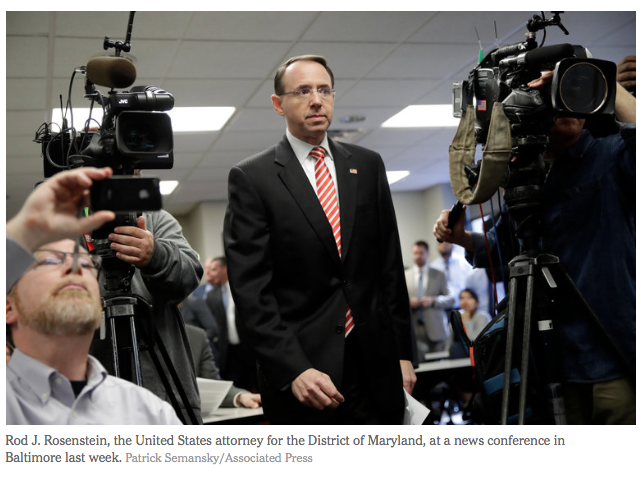 By ERIC LICHTBLAU MARCH 6, 2017
By ERIC LICHTBLAU MARCH 6, 2017
WASHINGTON — Known as a no-nonsense, even-keeled prosecutor, Rod J. Rosenstein was expected to sail through Senate confirmation to be the Justice Department’s second-in-command. But that process has become enmeshed in the drama surrounding questions about President Trump’s campaign ties to Russia. CLICK IMAGE for link to story.
Mr. Rosenstein faces the Senate Judiciary Committee on Tuesday as the president’s nominee for deputy attorney general. In that post, he would oversee investigations into Mr. Trump’s campaign and Russia, because Attorney General Jeff Sessions removed himself from any such cases after the disclosure last week that he had misled Congress about meeting twice with the Russian ambassador.
Democrats who have otherwise expressed confidence in Mr. Rosenstein’s prosecutorial skills said they were skeptical that he — or anyone besides an independent outside counsel — would not be subject to political pressure while overseeing such an investigation.
“Rosenstein has a good reputation as a career prosecutor, but this is going to test him, and I worry about the integrity of the Justice Department,” Senator Patrick J. Leahy, a Vermont Democrat on the Judiciary Committee, said in a telephone interview Monday.
Through his office, Mr. Rosenstein declined to comment.
The F.B.I., which is overseen by the Justice Department, is known to have examined possible contacts between Russia and Trump advisers. The House Intelligence Committee has also opened an inquiry into whether Russia tried to influence the election.
Mr. Rosenstein, who received his law degree from Harvard, is nothing if not a survivor after nearly 12 years as the United States attorney for Maryland under both Republican and Democratic presidents.
He was one of only three United States attorneys appointed by the administration of President George W. Bush to be kept in the job by President Barack Obama in 2009 — and the only one to last all eight years of Mr. Obama’s administration. His supporters say he has been willing to take on politically charged cases throughout his career.
Two decades ago, Mr. Rosenstein worked on Kenneth Starr’s independent counsel investigation into the Whitewater affair, earning three convictions related to President Bill Clinton’s business dealings in Arkansas.
In a high-profile leak case last year, Mr. Rosenstein extracted a guilty plea from James E. “Hoss” Cartwright, a retired four-star Marine general and a former vice chairman of the Joint Chiefs of Staff. Former Attorney General Eric H. Holder Jr. had asked Mr. Rosenstein and another prosecutor to handle the investigation after accusations the Obama administration was behind leaks related to a cyberattack and drone strikes.
Just last week, Mr. Rosenstein announced the indictments of seven Baltimore police officers on conspiracy and racketeering charges.
“He has a reputation for being a straight shooter who plays it right down the middle, and those are important qualities for a deputy attorney general,” said Matthew S. Axelrod, who was the top aide to former Deputy Attorney General Sally Q. Yates and is now in private practice in Washington at the Linklaters law firm.
Mr. Trump fired Ms. Yates as the acting attorney general five weeks ago after she refused to defend the initial version of his travel ban in court because she said she was uncertain it was legal.
Mr. Leahy, the Vermont senator, said that her firing made the debate over Mr. Rosenstein’s nomination even more important, with “that kind of precedent” hanging over him.
Douglas F. Gansler, a former Maryland attorney general, said on Monday, “Rod is about as apolitical a person as you can imagine, which is why he could survive eight years in a Democratic administration after being named by a Republican.” “Would he stand up to the political winds of President Trump?” he said. “I’d think yes.”
The Justice Department said Monday that if Mr. Rosenstein was confirmed, he would oversee any investigations related not only to the Trump campaign, but also to the president’s transition after the Nov. 8 election.
In announcing on Thursday that he would remove himself from such a case, Mr. Sessions had left open the possibility that he might still oversee matters related to the transition period. But in a letter to leaders of the Senate Judiciary Committee late on Monday, he said that his recusal “would include any such matters,” as well.
That question is important because Michael T. Flynn, who served as Mr. Trump’s national security adviser for less than a month, admitted that he had contacts with the Russian ambassador, Sergey I. Kislyak, during the transition. Some Democrats have said that those contacts — which helped force Mr. Flynn’s resignation — might have been illegal.
Mr. Sessions also spoke at least twice with Mr. Kislyak: once at the Republican National Convention in July, and again at his Senate office in September, two months before the election.
When asked at his confirmation hearing in January about a news article about contacts between the Trump campaign and Russian officials, Mr. Sessions responded, “I didn’t have, did not have communications with the Russians.”
Democrats accused him of lying to the committee by not disclosing his conversations with the ambassador, and they called for the Justice Department to open a perjury investigation. In his letter on Monday, Mr. Sessions said that “my answer was correct,” because he said his conversations with the ambassador were not political in nature.
In answering the question, Mr. Sessions wrote, “I did not mention communications I had had with the Russian ambassador over the years, because the question did not ask about them.”
Senator Charles E. Grassley, the Iowa Republican who leads the Judiciary Committee, said he was satisfied with the attorney general’s explanation.
“I appreciate Attorney General Sessions’s quick action to clear up confusion about his statement,” Mr. Grassley said Monday.


You must be logged in to post a comment Login